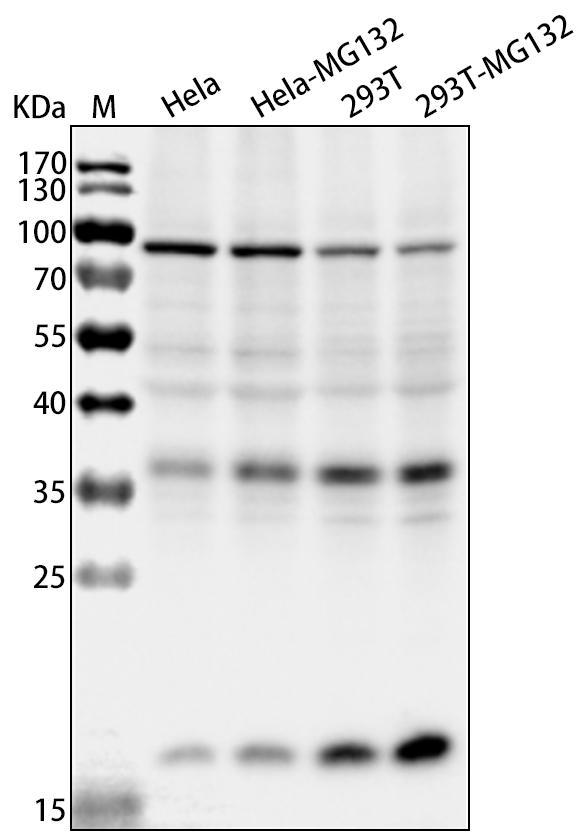
產(chǎn)品名稱:Anti-Sumo 1 Antibody, Recombinant Antibody, R7
克隆號:R7
抗體亞型:/
經(jīng)驗(yàn)證的應(yīng)用:WB/IP/IHC-P/ICC/IF/Flow Cyt (Intra)/ChIP
交叉反應(yīng):Human, Mouse, Rat
特異性:Recognises small ubiquitin-related modifier-1 (SUMO-1)
免疫原:Synthetic peptide
制備方法:/
來源:Recombinant Rabbit IgG
純化:Protein A purified
緩沖液:Supplied in PBS, 50% glycerol and less than 0.02% sodium azide, PH7.4
偶聯(lián)物:Unconjugated
狀態(tài):Liquid
運(yùn)輸方式:This antibody is shipped as liquid solution at ambient temperature. Upon receipt, store it immediately at the temperature recommended.
儲存條件:This antibody can be stored at 2℃-8℃ for one month without detectable loss of activity. Antibody products are stable for twelve months from date of receipt when stored at -20℃ to -80℃. Preservative-Free. Avoid repeated freeze-thaw cycles.
圖片:
Figure1.Western blot analysis of 293T and HeLa cells, untreated or treated with the MG132 (50 µM, 90 minutes), using RPTMA7A1-R7 at 2ug/ml dilution. Secondary antibody: HRP Goat Anti-Mouse IgG (H+L) at 1:5000 dilution. Blocking buffer: 5% nonfat dry milk in TBST. Detection: ECL Basic Kit. Loading control to GAPDH (PR00002HuP1).
Figure2.Immunofluorescent analysis of Hela cells , using RPTMA7A1-R7 (green) at 10ug/ml dilution. Nuclear DNA was labelled in blue with DAPI (blue).
別稱:DAP1, GAP modifying protein 1, GAP-modifying protein 1, GMP 1, GMP1, OFC10, PIC 1, PIC1, SENP2, Sentrin 1,Sentrin,Smallubiquitinrelated modifier 1, Small ubiquitin-like modifier 1, Small ubiquitin-related modifier 1, SMT3, SMT3 homolog 3,SMT3 suppressor of mif two 3 homolog 1, SMT3, yeast, homolog 3, Smt3C, SMT3H3, SUMO-1, SUMO1, SUMO1_HUMAN, Ubiquitinhomologydomainprotein PIC1, Ubiquitin Like 1, Ubiquitin like protein SMT3C, Ubiquitin like protein UBL1,Ubiquitinhomologydomain protein PIC1, Ubiquitin-like protein SMT3C, Ubiquitin-like protein UBL1, UBL 1, UBL1.
背景信息:Ubiquitin-like protein that can be covalently attached to proteins as a monomer or a lysine-linked polymer. Covalent attachment via an isopeptide bond to its substrates requires prior activation by the E1 complex SAE1-SAE2 and linkage to the E2 enzyme UBE2I, and can be promoted by E3 ligases such as PIAS1-4, RANBP2 or CBX4. This post-translational modification on lysine residues of proteins plays a crucial role in a number of cellular processes such as nuclear transport, DNA replication and repair, mitosis and signal transduction. Involved for instance in targeting RANGAP1 to the nuclear pore complex protein RANBP2. Polymeric SUMO1 chains are also susceptible to polyubiquitination which functions as a signal for proteasomal degradation of modified proteins. May also regulate a network of genes involved in palate development.
全稱:/



